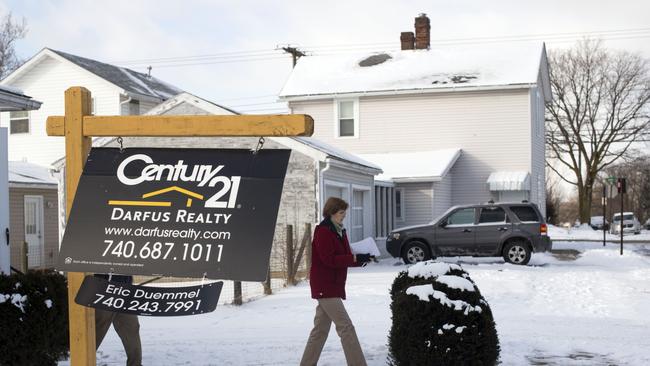Banks no longer rein in US mortgage market
As banks become more risk averse, other lenders have snatched the crown - and potentially added new dangers.

Banks no longer reign over the US mortgage market.
They accounted for less than half of the mortgage dollars extended to borrowers during the third quarter — the first quarter banks, credit unions and other depository institutions have fallen below that threshold in more than 30 years, according to industry analyst Inside Mortgage Finance. Taking their place are nonbank lenders more willing to make riskier loans banks now shun.
The shift reflects banks’ aversion to risk, especially in the mortgage market, in the wake of the housing meltdown and financial crisis. Banks also remain fearful of legal and regulatory threats that have cost them tens of billions of dollars in mortgage-related fines and settlements in recent years.
The change, though, gives rise to potential new dangers in the mortgage market. Chief among them is whether nonbanks have enough funds to weather a significant economic downturn in which missed payments on mortgages spike. Many of the loans these lenders are originating are effectively guaranteed by the US government, meaning that in the worst-case scenario taxpayers could be on the hook.
Six of the top 10 mortgage lenders by origination volume were nonbanks as of September, up from four for all of 2015 and two in 2011. The three largest US retail banks, J.P. Morgan Chase & Co, Bank of America and Wells Fargo & Co, accounted for about 50 per cent of mortgage dollars extended in 2011 — a share that dropped to nearly 21 per cent year to date through September, according to Inside Mortgage Finance.
Most large banks also are retreating from making mortgages insured by the Federal Housing Administration, a substantial piece of the mortgage market. This follows a series of costly lawsuits brought by the federal government surrounding these loans in the last few years.
“It’s becoming the perfect storm — when you punish banks, [they] don’t lend out money,” said Paul Miller, an analyst at FBR Capital Markets. “Banks are becoming utilities that are unable or unwilling to play with risk.”
Among the top 50 mortgage lenders, nonbanks extended 51.4 per cent of loan dollars in the third quarter, up from 46 per cent for all of last year, 19 per cent in 2012 and 9 per cent in 2009, according to Inside Mortgage Finance.
The two biggest nonbank mortgage lenders are Quicken Loans and PennyMac Financial Services.
Many nonbanks are courting borrowers who can’t get approved by banks, which have favoured customers with pristine credit.
“We’re not just looking for share gains anywhere we can get them,” said D. Steve Boland, managing director of consumer lending at Bank of America. Rather, he added, the bank is focused on “sustainable growth.”
As nonbanks get bigger, some analysts are concerned about their ability to weather tougher economic times. Unlike banks, nonbanks don’t take in deposits and rely largely on financing — mostly from banks — to keep loan volume going.
Most of their growth has occurred during a time of near record low delinquency rates. Should missed payments start to rise at some point, nonbanks’ financing sources would be at risk of shrinking.
“Because they’re not banks, they’re not as profitable and they have less liquidity — if defaults start to go up, they will literally run out of balance sheets,” said Chris Whalen, senior managing director at Kroll Bond Rating Agency.
Some nonbank lenders say concerns about liquidity are overblown. “We are not taking on credit risk — the loss is borne by [government] agencies, “ said Bob Walters, chief economist at Quicken Loans. “As long as there is a government guarantee, that is a powerful levelling factor that keeps the flow of funds going.”
Lending at Freedom Mortgage, the third largest nonbank lender, increased by 36 per cent to $US39.3 billion during the first nine months of the year compared with the same period a year prior. Stanley Middleman, chief executive and founder, expressed optimism about the performance of the company’s loans over the long run, citing the likelihood that unemployment will remain low and property values will continue to rise.
But he acknowledged that outlook could radically change if the economy slipped into recession. “Our ability to borrow could become impaired,” he said in a recent interview at the company’s headquarters in Mount Laurel, N.J.
The emergence of nonbanks also underscores a new mortgage lending strategy for banks. While their share of the market has fallen in terms of mortgages they are originating for borrowers directly, many are still providing the funding for nonbank lenders. Should nonbanks incur losses in a rising default environment, those losses could ripple over to their bank lenders.
Meanwhile, the largest banks have been aggressively courting affluent borrowers, in particular for jumbo mortgages they mostly hold on their books. The loans, which exceed $US417,000 in most parts of the country, have become more appealing because of their low chances of default. Banks also believe the loans are less susceptible to legal risk.
While their share of overall mortgage originations is down, big banks’ jumbo lending is on the rise. J.P. Morgan, Wells Fargo and Bank of America accounted for 42 per cent of jumbo dollars extended in the year’s first half, compared with 34 per cent in all of 2013, according to Inside Mortgage Finance.
Dow Jones




To join the conversation, please log in. Don't have an account? Register
Join the conversation, you are commenting as Logout